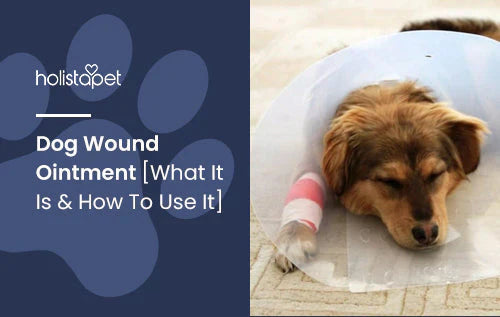When your dog is injured, it's crucial to be a good pet parent and take care of your best friend. First aid classes for canine injuries are practically non-existent, so independent research and personal preparedness can be incredibly valuable. How to give your dog CBD can also be an essential part of their recovery process, as CBD may help with pain relief and inflammation. In the unfortunate event of an injury, would you know how to heal a dog wound fast at home or know if an ointment is appropriate for wound care?
What Is a Dog Ointment and When To Use It?
A dog ointment is a substance that forms a thin, protective barrier over the wound, relieves discomfort, and also fights bacteria that can lead to a severe infection. Also known as a three-way ointment for dogs, these products dedicated to antibiotic wound treatment can help minor or superficial wounds. Dog wound care ointment is a great option, especially when dealing with:
Surface scrapes, scratches, and abrasions
If your dog tumbles on a rough surface, their skin can get banged up. Wound aid ointment for dogs can help heal, protect the injury, and provide much-needed pain relief.
A minor puncture wound or minor cut
A puncture wound may occur if your dog steps on a nail, sharp metal, broken glass, or plastic shards. Prompt use of wound ointments helps prevent an infection!
Rashes, skin irritations, and hot spots
Bad bacteria can irritate your dog's skin-related issues and lead to excessive scratching. Ointment for dogs helps treat hot spots by combatting bacteria that inflame the skin.
Infection prevention
Sometimes, a post-injury infection is more serious than the initial injury. Proper wound care with ointment can prevent or reduce infections from wounds. Veterinarians may also recommend wound ointment or wound care spray gel following surgery or a major injury to help heal. However, with any ointment, it's essential to ensure it's for topical, external use so your pup can't ingest it by licking.

When To Take Your Dog to the Vet
Not every injury may seem serious at the time, but if left untreated, some can quickly become life-threatening. If your pup has a major wound or injury, remain calm and immediately take your dog to the veterinarian or go to an emergency animal hospital. You should always get professional medical attention for the following:
- Deep puncture wounds, cuts, or excessive bleeding that you cannot control.
- Any foreign object embedded in the wound, such as glass, wood, plastic, or metal.
- Serious burns can lead to infection.
- Stomach, limb, or paw swelling. This can be the result of many possibilities. Don't wait — go to the vet immediately, especially if the swelling persists.
- Lingering pain or discomfort to get a proper diagnosis and obtain medication that quickly relieves pain to reduce unnecessary suffering.
- Animal bites of any kind, even small ones, may lead to infection.
- Snake bites or venomous insect bites.
- Torn skin after a dog fight or other altercation.
- Any type of accident involving a motor vehicle or bicycle.
- Head trauma, even if there is no visible injury.
- Limping or balancing issues of any kind.
- Difficulty breathing or noticeable rasping.
- Vomiting or diarrhea.
A good rule of thumb is that if you're unsure about taking your dog to the veterinarian and seeking treatment due to a wound, it's probably best to go in. At the very minimum, call your vet and seek prompt medical advice.
Supplies Needed for Dog Wound Care
Many people have a first aid kit gathering dust somewhere in a bathroom cabinet, but it's a good idea to include items that a dog may need in case of injuries. If you carry a kit in your car, consider adding supplies for your dog to that one as well. Hopefully, you'll never need it, but a basic first aid kit for dog wound care should include:
- Self-adhesive, sterile bandages, not just small ones made for people.
- Saline solution and, if possible, soap and water.
- Antibacterial ointment that's safe for dogs.
- Tweezers or small forceps.
- Clean bandannas or towels for wraps, bandages, or broken limb support.
- Scissors for cutting bandages or towels.
- Muzzle. Even your best friend can lash out when injured and in pain.
If you don't have a first aid kit, you should start shopping for one. Hopefully, you or your dog will never need it. But it's always best to be prepared and have one at the ready.
Can You Use Neosporin on Dogs?
Yes, you can use Neosporin ointment for your four-pawed patient in an emergency. Johnson & Johnson makes Neosporin primarily for human use, not as an ointment for dog wound care. Neosporin creates a thin barrier over the wound and contains three different antibiotics — bacitracin, neomycin, and polymyxin B. that fight bacteria and prevent infection. As an alternative to Neosporin, the pet-friendly antibiotic Mupirocin is also an option.
What to Know Before Using Neosporin on Your Dog
Before applying Neosporin to an injured dog, there are a few things to consider. In general, using small amounts of Neosporin will not harm your dog, but care and caution are warranted. Before spreading it over the entire wound, apply a small amount to determine if there's a visible, negative reaction.
Next, because a dog's instinct is to lick the wound (nature's method of cleaning it), you'll need to immediately bandage the wound to protect it. You don't want the dog to lick the infection-fighting ointment or ingest any ingredients. You must also consider ways to keep your dog from licking the bandage. While we all know dogs hate wearing recovery cones — playfully known as the "cone of shame" — they can be vital in helping your pup heal from their injuries.
How To Clean and Treat Your Dog's Wound
Cleaning and treating the wound as soon as possible following an injury is critical. Never assume "nature" will take care of it. When your best friend sustains an injury, it's easy to become rattled, but you must remain calm and become an emergency caregiver. Providing Immune Support + Functional Mushroom Soft Chews for Dogs can also help support your dog's natural healing process. Here's a quick checklist on how to clean a dog wound:
1. Stop the bleeding
Just as you would with a human patient, your first priority is to control the bleeding. Place a clean bandage, a sterile gauze pad, a clean bandana, or even a towel directly over the wound. Gently but firmly apply consistent pressure to help stop or slow the bleeding. If the material becomes soaked with blood, do not remove it, as this could disrupt clotting; instead, layer more clean material on top and continue to apply pressure.
2. Clean the wound
For most wounds, begin by gently washing the area with mild soap and lukewarm water, taking care to remove any visible dirt, debris, or contaminants. Rinse the wound thoroughly to ensure no soap residue remains, as it could irritate the tissue. After rinsing, gently pat the area dry with a clean towel or gauze. If the bleeding persists and cannot be controlled, wrap the wound securely but not too tightly to minimize further injury, and immediately consult your veterinarian or head to an emergency animal hospital for professional care.
3. Remove foreign objects
If you notice a nail, splinter, piece of wood, or any other foreign object lodged in the wound, it’s important to remove it carefully to prevent further damage or infection. Using clean tweezers or sterilized forceps, gently grip the object and pull it out slowly and steadily to avoid breaking it off inside the wound. Be cautious not to push the object deeper or cause additional trauma to the surrounding tissue. Once the object is removed, thoroughly inspect the area to ensure no fragments remain.
4. Re-clean or disinfect the wound
After removing any foreign objects from the wound, it’s crucial to re-clean the area to ensure all contaminants are eliminated. Gently rinse the wound again with lukewarm water or a saline solution, then use a mild antiseptic or antibacterial product such as Neosporin (following the guidelines above) to help prevent infection.
5. Pat dry
After cleaning and disinfecting the wound, it’s important to dry it thoroughly to prevent bacteria from thriving in a moist environment. Use a clean towel, sterile gauze, or a fresh bandana to gently pat the area dry, being careful not to irritate or reopen the wound. Avoid rubbing the wound, as this can cause further damage or pain.
6. E-Collar or recovery cone
To protect the wound and ensure proper healing, consider using a plastic E-collar, often humorously referred to as the "cone of shame." This device prevents your pet from licking, biting, or scratching at the injury, which could reopen the wound, introduce bacteria, or delay the healing process.
NOTE: When caring for a dog's wound, never use shampoos, rubbing alcohol, hydrogen peroxide, or hydrocortisone products unless your veterinarian informs you to do so. These products can cause further irritation.

What Are the Best Natural Antiseptics for Open Wounds in Dogs?
When choosing an antiseptic product for wound care, caution is warranted to ensure they're safe for dogs. Fortunately, there are several holistic, natural antiseptic options available for dog wound care. However, we recommend contacting your veterinarian for advice regardless of which holistic option you choose. The best natural antiseptics for dog wounds include:
- Witch Hazel. This is an all-natural astringent that helps with skin irritation to decrease scratching. Ensure it's vegetable glycerin-based and alcohol-free.
- Turmeric. With natural anti-inflammatory and antiseptic properties, turmeric is perfect for cleaning the wound and fighting infection from setting in. Turmeric is spicy, which also prevents licking.
- Coconut Oil. Providing a bounty of natural antiseptic and anti-inflammatory properties, coconut oil also contains lauric acid, which has anti-viral, anti-fungal, and anti-parasitic properties.
- Manuka Honey. Hailing from New Zealand, the Manuka Flower (Leptospermum scoparium) contains natural antibacterial compounds that create tiny amounts of hydrogen peroxide. Manuka honey also acts as a barrier and skin protectant like an ointment.
- Saline Solution. Simple, pure, saline solution works well for rinsing a wound and helping the skin tissue recover.
- Make Your Own Saline Solution. Mix 1 cup of boiling water with ½ teaspoon of salt and stir until the salt is fully dissolved. Wait until this mixture cools before applying, and never reuse it — always make a fresh batch.
Final Thoughts
Dog parents know the joy that their furry friend brings into their lives. We want the best for them, but accidents happen, so be prepared to render first aid when needed. After treating the scratch, cut, or puncture, wound ointment can help prevent infection and help the healing process. If you have questions about treating the injury, never hesitate to call your vet, even for minor wounds.







![Probiotics For Dogs [Soft Chews] - HolistaPet](http://www.holistapet.com/cdn/shop/files/Probiotic-Infographic-1_472d7a29-e30c-435a-9638-1365d8c3a9f9.jpg?v=1725384841&width=104)



























Leave a comment
All comments are moderated before being published.
This site is protected by hCaptcha and the hCaptcha Privacy Policy and Terms of Service apply.